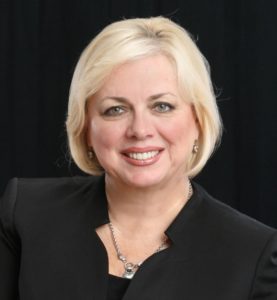

Tanya Barnes, Golden Seeds managing director and member of the board of directors of BoardBookit
March 1, 2018 Golden Seeds is focused on investing in the vibrant opportunities of women-led companies. As such, we work with many talented, passionate female entrepreneurs who are doing truly remarkable things. Our “How Did She Do It?” series shares the stories, challenges and successes of the women behind the companies of Golden Seeds.
Golden Seeds is focused on investing in the vibrant opportunities of women-led companies. As such, we work with many talented, passionate female entrepreneurs who are doing truly remarkable things. Our “How Did She Do It?” series shares the stories, challenges and successes of the women behind the companies of Golden Seeds.
Today, Tanya Barnes, board member of BoardBookit, interviews Marion Lewis (left), CEO of BoardBookit. Below, they discuss how Lewis launched BoardBookit, an app that serves both as a scheduling tool for boards of directors and a document repository for sensitive information.
BoardBookIt — trusted by companies in the United States, Canada, Europe and Australia — is a boardroom empowerment platform designed to transform the way companies plan, create and manage board meetings and the way board members experience them.
ML: I’m a serial entrepreneur. BoardBookit is my fourth company and it spun out of a previous company I had, a service company that developed mobile apps. One of my clients approached me to see if we could develop a mobile app for the publicly traded company’s board of directors to access board information in one convenient place. To build this from scratch was going to be quite expensive, so, in thinking that we couldn’t possibly be the first to have thought of this, I started doing some research.
I discovered there was a huge hole in the market and realized this was a real opportunity. We spun out our intellectual property from the mobile app company and started BoardBookit. We knew that we could build something that was SaaS-based and all the benefits that would imply for customers. That was in 2013. We spent probably half of that year just doing the research and putting together the team that was going to help build the product and take it to market, and then we built and introduced the product in 2014.
ML: Boards of directors are often geographically disparate, which can make it difficult for an administrative team to schedule meetings, manage RSVPs and securely distribute agendas and board books. Before we came along it was an incredibly time- and human resources-intensive process. Companies eventually started distributing documents via email, but there are security concerns with that practice, as well. Boards need a secure and easy-to-access document repository. I’ve served on quite a few boards, and can recall the frustration that goes along with needing to look at by-laws or a strategic plan without a central place to store them. If you don’t have a central repository for that, then you’re scrambling all the time to find the information that you need.
Our board portal platform is a central place to store all the logistical information, to schedule meetings, to create the board books and the agendas, to manage the rosters. Email is not a secure way to be distributing sensitive documents. Not only does our board portal address all the logistical issues, but we baked security into its DNA.
ML: The challenges with BoardBookit were different than my other companies, which were service companies. With service companies, you grow based on what projects you have. This is a product company. For example, we had significant costs putting a team together and building a product before we even went to market. I have a business partner who’s the chief technology officer, and we funded it ourselves for the first year. But then we had to go out and raise money. Raising money is difficult, particularly when your company is in a pre-revenue stage, which we were at that time.
ML: We’re looking for this year to be our break-out year. It’s going to be a considerable growth year for us. We finished our Series A fundraiser in December. Golden Seeds took the lead on that raise, which is dedicated to sales and marketing. We have a really mature, robust product. We plan to go to our customer base to see what platforms they’re using and to determine if we can integrate those into our product. We’re also looking at new use cases for our product. For example, we have about 20 percent of our client base in banking and finance. We know that a lot of those banks are using our products for their boards, but they’re also using it for their loan committees. Those committees need the same functionality to review the documents, to be able to put them online. We’re going to be looking at several use cases to make specific changes to the products. We hope to take BoardBookit out of just the board room and into the entire enterprise.
ML: It’s hard to do. The pre-revenue stage can be incredibly difficult. For example, when I first went to Golden Seeds, we were just way too early. That was a learning experience. The second time around, I knew what I needed to do to be prepared and attractive to investors.
Entrepreneurs should start to plan a fundraising strategy from day one. You’re planning your exit the day you start your company. Talk to people in the industry, talk to people who have done this, determine which milestones you should be looking at before you go to raise money. Really educate yourself on that. Investors are giving you their money, so they want to know you have metrics in place that are going to make you successful. Golden Seeds really pushed me on those kinds of numbers; it made me sharper.
My other advice is to be authentic, trust your vision, and don’t be afraid to build a company culture around that. Your team will look to you for guidance and leadership. Make sure that everything you say and do affirms the vision and values you’re building your company on. They will notice and follow.
Finally, seek out other women entrepreneurs. My strongest mentors, peers, collaborators and sources of strength have been other women on the same entrepreneurial journey.
ML: I’m a firm believer that everything we experience, the good and the bad, contribute to make us the person we are today. I try to view everything in my career from that perspective. But if I had to choose one thing I would do differently, it would be to become an entrepreneur earlier. There is a learning curve to becoming a successful entrepreneur, and I wish I had started earlier. All the things that frustrated me about a corporate job are tailor-made for being an entrepreneur, though I didn’t know that at the time. Knowing what I know now, I would have made the leap sooner.
ML: Their focus on women-owned companies is why I went there in the first place. They were really great about telling me why they didn’t choose me the first time around and what I needed to do before I came back. That was helpful. It was three years before I went back to Golden Seeds, and when I did, I had made sure we had enough revenue and enough history to be a compelling story for an investor.
Golden Seeds has been really good about making introductions for me to people they think might help grow the business, including other potential investors. They were extremely helpful in supporting me as we closed out the round, and as we built a strong board.
I’m an angel investor myself, now. As an angel, the main goal is to make money, but if we can support women-owned companies, that’s a terrific bonus, and Golden Seeds is dedicated to that effort.
For more wisdom like this from other amazing female leaders, follow Golden Seeds on Twitter.